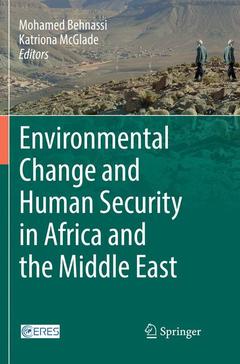Description
Environmental Change and Human Security in Africa and the Middle East, Softcover reprint of the original 1st ed. 2017
Coordinators: Behnassi Mohamed, McGlade Katriona
Language: English
Subjects for Environmental Change and Human Security in Africa and...:
Support: Print on demand
Description
/li>Contents
/li>Biography
/li>Comment
/li>
This volume brings together insights on the interactions between environmental change and human security in the Middle East and Africa. These regions face particular challenges in relation to environmental degradation, the decline of natural resources and consequent risks to current and future human security.
The chapters provide topical analysis from a range of disciplines on the theory, discourse, policy and practice of responding to global environmental change and threats to human security.
Case studies from Morocco, Tunisia, Egypt, Turkey, Iraq and Syria provide empirical evidence, with a focus section dedicated to the critical issue of water resources and water security in the region.
The contributions demonstrate above all that the risks posed to human security arise through multiple and interconnected processes operating across diverse spatial and temporal scales. The complexity of these processes requires new ways of thinking and intervening. As a contribution, the current volume provides engaging insights from theory and practice for those seeking to address the challenges of environmental change.
Part I. Global Environmental Change as a Human Security Issue.- Chapter 1. Climate Security as a Framework for Climate Policy and Governance (Mohamed Behnassi).- Chapter 2. Environmental Change and the Crisis of Dominant Development Models: A Human Security-Centered Analysis (Reda El Fellah).- Chapter 3. Is Human Security a Relevant Concept in the Context of Climate Change Adaptation Policies? (Katriona McGlade).- Part II. Impacts of Environmental Change and Implications for Human Security – Case Study Examples.- Chapter 4. Climate Change Impacts on Water Availability and Human Security in the Intercontinental Biosphere Reserve of the Mediterranean (Morocco-Spain) (Diana Pascual).- Chapter 5. Impact Assessment of Environmental Change in Nuba Mountains of Sudan (Taisser H.H. Deafalla).- Chapter 6. Global Environmental Change as a Human Security Threat: Situation in Nigeria (Suleiman Iguda Ladan).- Chapter 7. Eco-Adaptation Strategies of Health to Climate Change: Case of Zoonotic Cutaneous Leishmaniasis (ZCL) as Vulnerability Indicator in Pre-Saharan Region of Morocco (Kholoud Kahime).- Chapter 8. Anticipating Emerging Risks and Vulnerabilities from Sea Level Rise Induced Preventive Resettlement in Greater Alexandria, Egypt (Niklas Baumert).- Chapter 9. Targeting Consumer Groups and What They Consume for the Mitigation of Climate Change in India (Madhumati Dutta).- Chapter 10. A New Era for Energy and the Environment: The Nightmare Scenario of Shale Gas for the Arab Gulf Countries (Nabil Sultan).- Part III. Regional Focus on Water Security.- Chapter 11. Water Resources, Food Security and the Role of Virtual Water Trade in the MENA Region (Marta Antonelli).- Chapter 12. Managing Water Crisis in the North African Region – With Particular Reference to Jijel Region (Abdelhafid Aimar).- Chapter 13. Turkey’s Water Policy in the Euphrates-Tigris Basin (Özden Zeynep Oktav).- Part IV. Some Critical Perspectives and Approaches for Addressing the Impacts of Environmental Change on Human Security.- Chapter 14. Human Relationship to the Land from a Legal Perspective as a Human and Environmental Security Challenge (Olivier Barriere).- Chapter 15. Environmental Change and Gender: Rethinking Traditional Approaches to Food Security in Rural Beitbridge, Zimbabwe (Mark Matsa).
Mohamed Behnassi
Mohamed Behnassi, specialist in Environment and Human Security Politics, is Associate Professor, Director of the Research Laboratory for Territorial Governance, Human Security and Sustainability (LAGOS), and ex-Head of Public Law Department (2014-2015) at the Faculty of Law, Economics and Social Sciences, IbnZohr University of Agadir, Morocco. He was the Founder and Director of the North-South Center for Social Sciences (NRCS) from 2008 to 2015, and is currently Director of the Center for Research on Environment, Human Security and Governance (CERES). Dr. Behnassi is Member of the Moroccan Association for Regional Sciences (AMSR), and Active member of the National Council for Climate Change, Sustainable Development and Leadership (NCCSD), India. He is also Senior Social Compliance Auditor (practicing consultancy by monitoring human rights at work and the sustainability of the global supply chain).
Dr. Behnassi obtained his Ph.D in 2003 from the Faculty of Law, Economics and Social Sciences, Hassan II University of Casablanca for a Thesis titled: Multilateral Environmental Negotiations: Towards a Global Governance for Environment. In 2011, he completed a U.S. State Department-sponsored Civic Education and Leadership Fellowship (CELF) at the Maxwell School of Citizenship and Public Affairs, Syracuse University, USA and in 2014 he obtained a Diploma in Diplomacy and International Environmental Law from the University of Eastern Finland and the United Nations Environment Programme (UNEP), Finland. Dr. Behnassi has pursued several post-doctoral trainings since the completion of his PhD.
His core teaching and expertise areas cover: Environmental change, human security, sustainability, climate change politics and governance, human rights, CSR, etc. He has published numerous books with international publishers such as: Environmental Change and Human Security in the Middle East and
Offers theoretical and conceptual debates on global environmental change and human security
Features a dedicated section on the critical challenge of water security in the Middle-East and Africa
Contains empirical research findings from a range of countries in the Middle-East and Africa including Morocco, Tunisia, Egypt, Sudan, Turkey, Iraq and Syria with additional analysis from international cases




